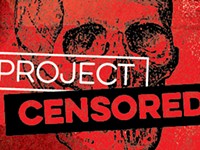[
{
"name": "500x250 Ad",
"insertPoint": "5",
"component": "15667920",
"parentWrapperClass": "",
"requiredCountToDisplay": "1"
}
]
The 9/11 Commission's hearings are providing great drama. And yes, we need to find out whether the Bush administration --- or the Clinton administration --- could have prevented that tragedy.
But that investigation must not distract us from another key issue: the shoddy evidence and dreadful decision-making that led us into our war against Iraq. Here, there's little ambiguity. Plenty of dissembling, but little ambiguity.
Mere citizens, overwhelmed by our own concerns, don't want the responsibility of wrestling with complex national issues. But this has the makings of a major scandal. And unless we come to grips with the evidence, the Bush administration and a compliant Congress will continue to lead us into disaster.
The administration has played bait and switch with its reasons for the war. The story now is that we have freed Iraq's people from terror of Saddam Hussein. That is true; he is no longer a threat to them. But that was not the reason George Bush gave for going to war. He was clear: We went to war not to protect the Iraqi people but to protect the United States from the terror we knew Saddam Hussein was preparing to unleash on us.
Whether the administration believed that story or not, the facts are now clear. There was no evidence of a threat to us: no evidence that Saddam Hussein had weapons of mass destruction, no evidence that he had the capability to attack us. No evidence.
Every mainstream news report has documented that fact. So has the person most qualified to reach that conclusion: Hans Blix, who was director of the United Nations Inspection Commission.
In his book Disarming Iraq,Blix says that initially, he believed that Iraq did have dangerous weapons. The UN inspectors could not find any, however, and in the end, he did not think they existed.
And, he writes: "Even if one day there were to be solid evidence that Iraq had maintained some low-key illegal programs, it would not change the conclusion that the categorical assertions about the existence of weapons of mass destruction --- and the dismissal of doubts about those assertions --- were plainly wrong."
The United States, Blix notes, had no intelligence agents in Iraq. It got its information about Iraqi weapons programs from Iraqi defectors (some of whom had their own reasons for wanting the US to go to war).
The UN inspectors were inside Iraq, though. And the Bush administration, writes Blix, paid those inspectors' reports "too little attention."
"When the reports were used at the political level," writes Blix, "there was a tendency to misread them and use them in support of preconceived convictions. The contempt which both Vice President Cheney and the leadership in the US Department of Defense appear to have held for international inspections deprived them, in effect, of a valuable source of information."
This is damning evidence --- from an impartial source who had inspectors on the ground, looking for the evidence the Bush administration used to lead the United States and some of its allies into war.
We cannot avoid the questions: Did the Bush administration lie to us about its reasons for going to war? Did it use the 9/11 attacks as an excuse?
If Bush had believed there were no such weapons, would he have led us into war? Would he have told the American public, our traditional allies, and the United Nations, that we needed to go to war solely to overthrow Saddam Hussein?
Would he have said: "This guy's a brutal dictator and he needs to be removed"? Would he have said: "And if other nations don't want to do it, if the UN doesn't want to do it, we'll do it ourselves"?
Is that the foreign policy we want? Do we want the United States alone to determine which brutal dictators stay and which must go? Are we willing to spend the resources --- financial, human --- to impose that authority?
Do we understand the national security risks involved? Do we understand the international security risks?
It is clear that the Bush administration did not have the evidence it said it had about weapons in Iraq. And it is clear, horrifying clear, that the Bush administration had no credible information about what would happen after Shock and Awe.
We need answers to many things: whether the administration misled us intentionally or with the best of intentions; why it believed, and continued to repeat, false reports about Iraq's weapons programs; why we were not better prepared for the aftermath of the war; whether the war has diverted attention and resources from the fight against terrorism.
But to the most important question --- should we have waged our preemptive war against Iraq --- we know the answer. And that answer should drive not only policy debates in Congress but the public's deliberation as we head for the November presidential election.
Want to comment? Write
Speaking of...
-

Giuliani pick splits Fisher alumni
Apr 29, 2015 -

Project Censored
Nov 19, 2014 -

Toward what end? Obama's ISIS policy
Sep 17, 2014 - More »
Latest in Columns
More by Mary Anna Towler
-

Police reform: advocates on what should come next
Oct 22, 2019 -

Court clears the way for Police Accountability referendum
Oct 17, 2019 -

Dade outlines initial actions on district deficit
Oct 9, 2019 - More »





